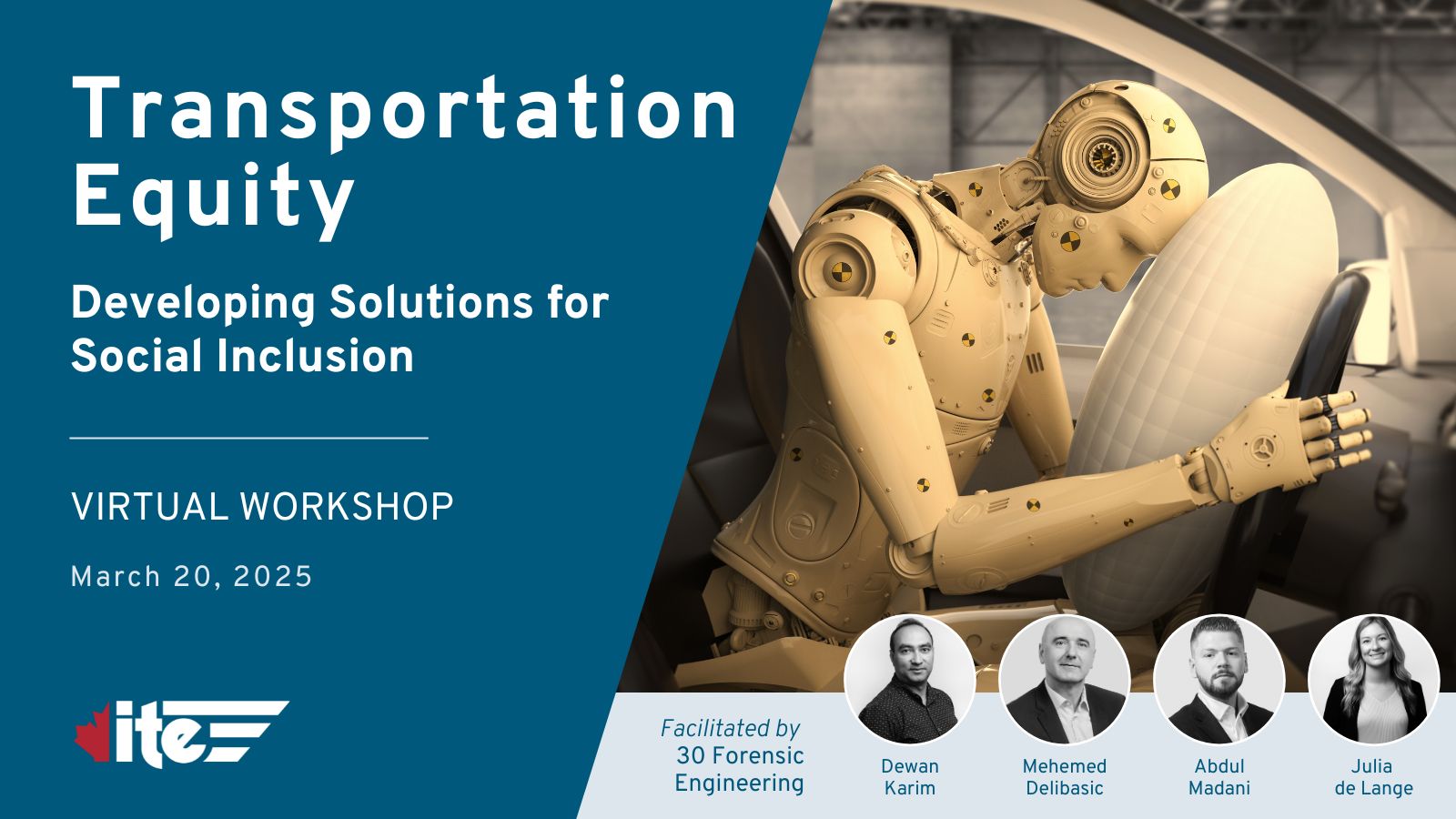

This session will qualify for PDH credits for attendees. The registration deadline for this event is March 19, 2025.
Note: This event was previously scheduled for February 18, 2025
Transportation systems shape access to opportunities, yet mobility inequalities persist. Social exclusion in mobility is not a new issue, but systematic inclusion principles and processes remain limited, and the knowledge in this area is yet to be fully developed. This training course seeks to help transportation professionals understand how changes to transportation systems can be more socially inclusive and address issues of inequality.
Supported by internal research and developed by a diverse team of experts, this workshop combines strong theoretical foundations with practical applications to offer a comprehensive approach to transportation equity. Participants will learn how transportation equity principles, tools, and solutions translate into real action and change the course of transportation infrastructure programs and delivery. The goal is to equip transportation practitioners with the tools to create more inclusive, resilient, and just mobility systems.
Participants will learn from real-life examples of safety incidents, collisions and practice safety measures where transportation equity plays a significant role in fostering inclusion and upholding human rights, informed by the instructor’s legal expertise. This course will provide alternative perspectives to align transportation policies, programs and implementation with the Canadian National Human Rights Charter, treating equity as a fundamental right, not just as an additional consideration. Training content highlights systemic exclusion, its impact on marginalized communities, and strategies to mitigate unintended consequences and address equity gaps. By integrating well-established and emerging transportation equity concepts into practical applications, the course equips participants with the knowledge to embed equity into everyday transportation practices and decisions.
The half-day course is divided into several sections:
Transportation engineers, planners, land use planners, urban designers, mobility technology service providers, and other professionals involved in urban mobility system development, who are focused on promoting equity within sustainable mobility solutions.
As a result of attending the training, practitioners will be able to:
Instructors: Dewan Karim, P.Eng., Abdulrahman Madani, Dr. Julia de Lange, and Mehemed Delibasic, P.Eng.
Support: Abdul Razak Alozi, Maryam Hasanpour
Dewan Karim, Mehemed Delibasic, Abdul Madani, and Julia de Lange are experts with 25+ years of combined experience in transportation safety, engineering, and biomechanics at 30 Forensic Engineering. Their work spans transportation planning, traffic safety, Vision Zero, geometric design, and injury biomechanics, with academic and industry contributions in Canada, Japan, and Dubai.
Mr. Dewan Karim is a Practice Lead of the Transportation and Safety Group at 30 Forensic Engineering. Dewan has worked in the public and private sectors in Japan and Canada for 25+ years of his career, pioneering creative ideas in transportation engineering and planning. Dewan has investigated strategic safety and location-specific collisions from traffic engineering and safety regulations for all street users including motor vehicles, cyclists, pedestrians, off-road and commercial vehicles, trucks, and motorcycles.
Mehemed is Vice President of the Transportation and Safety Group at 30 Forensic Engineering. With over 25 years of comprehensive professional experience, Mehemed has been involved in and managed numerous multi-modal transportation planning studies, transportation master plans, and transportation planning/traffic engineering studies. His most recent experience applies an equitable approach for Transportation/Active Master Planning Studies, including affordable and equitable accessible transportation options. Mehemed is a recognized subject matter expert on the latest multi-modal transportation master planning studies, active transportation master plan studies, parking, and traffic safety, and has delivered several presentations on these topics at industry events.
Mr. Abdul Madani is an Associate with the Transportation and Safety Group at 30 Forensic Engineering. He graduated from the University of Sharjah with Bachelor of Science in Civil Engineering and a Master of Engineering in Civil Engineering from McMaster University, with a specialization in geometric design risk and reliability assessment and highway safety. Prior to joining 30 Forensic Engineering, Abdul worked for the Transportation sector in the Government of Dubai where he gained a range of skills in traffic safety, work zone safety and traffic management, road users’ safety, policy updates, and Vision Zero projects.
Dr. Julia de Lange is an Associate with the Biomechanics and Personal Injury group at 30 Forensic Engineering. She earned her M.A.Sc. and Ph.D. in Biomedical Engineering at McMaster University after completing her undergraduate degree in Biomedical Engineering at the University of Guelph. Her research focused on developing enhanced injury tolerance criteria for automotive and defense applications, and appropriately translating these to crash test dummies. She has taught undergraduate courses in Biomedical Engineering and Mechanical Engineering at McMaster University.
The registration deadline for this event is March 19, 2025.